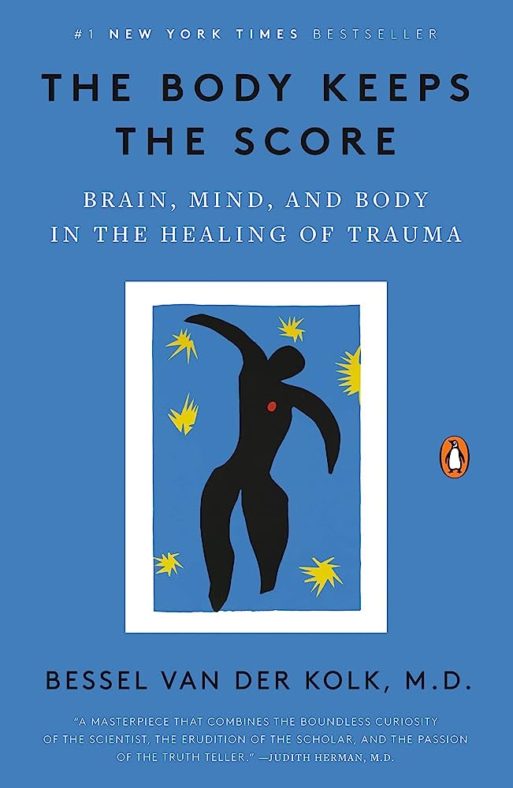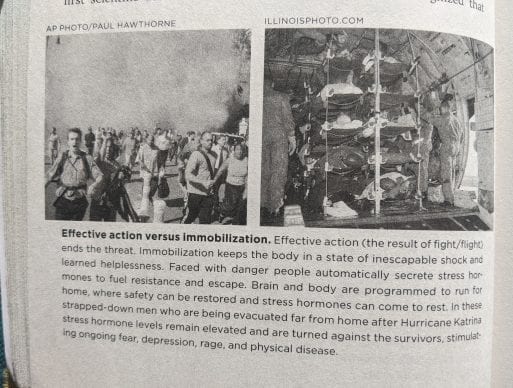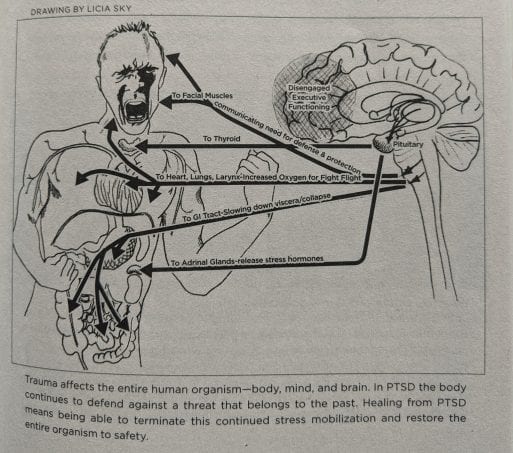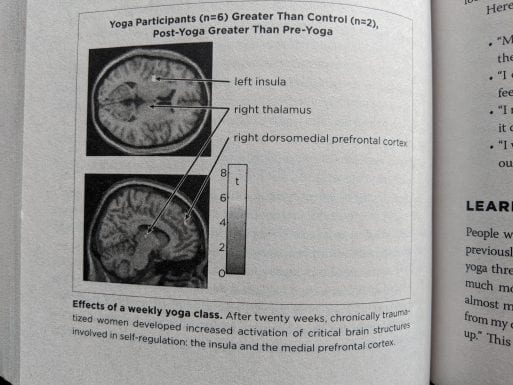 Dr. Bessel van der Kolk is one of the world’s leading experts on trauma and has spent three decades working with survivors. He has compiled his research on the physiological effects of trauma in his 2015 book, “The Body Keeps the Score: Brain, Mind, and Body in the Healing of Trauma.”
Dr. Bessel van der Kolk is one of the world’s leading experts on trauma and has spent three decades working with survivors. He has compiled his research on the physiological effects of trauma in his 2015 book, “The Body Keeps the Score: Brain, Mind, and Body in the Healing of Trauma.”
How The Body Keeps the Score
Dr. van der Kolk’s book isn’t just an intensive look at how trauma physiologically affects us in the long and short term. It also provides us with a detailed history of the way trauma has been understood, diagnosed, and treated, for better or for worse. The first part of the book defines trauma and post-traumatic stress disorder (PTSD). We learn about brain anatomy, the connection between mind and body, and the effects that acute and chronic trauma can have.

In the chapter, “Running for your life: the anatomy of survival,” Dr. van der Kolk explains that being able to move and do something to protect oneself is a critical factor in determining whether or not a traumatic experience will leave long-lasting scars
Dr. van der Kolk presents this information using empirically-based evidence and research statistics, bringing the more scientific aspects of trauma to life with human stories from Vietnam veterans and victims of assaults, abuse and accidents. It can get technical at times, as it should. But Dr. van der Kolk keeps the information accessible and comprehensible to the layperson both with the language and imagery he uses.

Dr. van der Kolk argues that a traumatized individual’s attempts to “maintain control over unbearable physiological reactions can result in a whole range of physical symptoms and autoimmune diseases”
How Humans Can Mitigate the Physiological Effects of Trauma
The second half of the book speaks to the evolution of different therapies and potential pathways for recovery. He is concerned less about how medications can make symptoms “disappear,” and is primarily focused on what we can do to mitigate the physiological effects of trauma. I appreciate his point of how medications can be helpful and valuable for some, but should never be used as the sole treatment.
Instead, Dr. van der Kolk stresses the importance of becoming aware of one’s body. He argues that learning how to restore physiological equilibrium will reduce overwhelming emotions and serve to bring survivors back into the present. As such, he dedicates chapters to yoga, EMDR (Eye Movement Desensitization and Reprocessing), neurofeedback, writing, and theater among others.

Dr. van der Kolk’s research has opened up new perspectives on how noticing and befriending sensations in our bodies can produce profound changes in both mind and brain that can lead to healing
Who Should Read “The Body Keeps the Score?”
While “The Body Keeps the Score” seems most useful for trauma survivors and specialists in the field, it can be useful for anyone. Trauma and PTSD don’t just arise from the “classic” cases of war and childhood sexual abuse — less obvious threats to our sense of safety and acceptance can have debilitating effects on our sense of self and how we interact with the world, including the death of a loved one, a car accident, bullying, neglect, and more.
I will warn that some descriptions of traumatic events were very difficult to get through. I put the book down several times. It was profoundly affecting to read and remember that humans are capable of committing horrible atrocities on one another. Mental health professionals and trauma specialists are probably accustomed to this. But those looking for help for their own trauma may find some parts of the book triggering or unbearable.
That being said, the book is not all sadness and despair. “The Body Keeps the Score” does show the devastating effects that unprocessed trauma can have on our health, body, and mind. But, it also provides hope in a path forward and demonstrates that humans are also capable of incredible self-preservation, healing, and connection.

 “The Body Keeps the Score: Brain, Mind, and Body in the Healing of Trauma,” by Dr. Bessel van der Kolk
“The Body Keeps the Score: Brain, Mind, and Body in the Healing of Trauma,” by Dr. Bessel van der Kolk


 First the Wealth Gap, Now the U.S. Has a Growing Health Gap
First the Wealth Gap, Now the U.S. Has a Growing Health Gap
 How to Comfort A Dying Loved One
How to Comfort A Dying Loved One
 Our Annual Seven Holiday Gifts for Someone Who Is Grieving, 2024 Edition
Our Annual Seven Holiday Gifts for Someone Who Is Grieving, 2024 Edition














